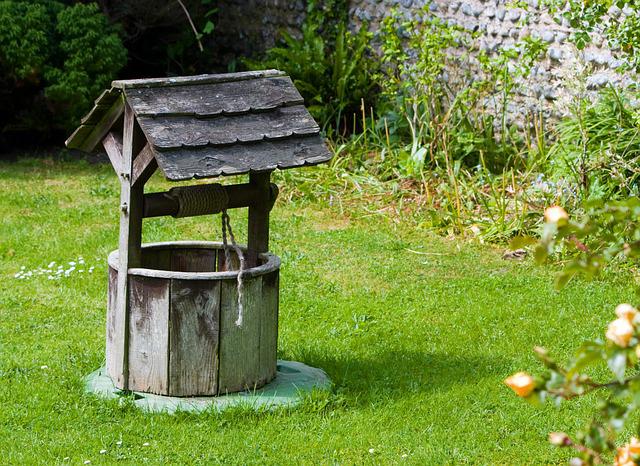
There is a myth that gets told in just about every culture, with variations depending on the time and place. And the myth goes something like this: there was once a poor girl who dropped her spindle in the well. She begged the well to give it back, but the well wouldn’t give. The well demanded she top it off with fresh water before the well would give back the spindle. So the girl ran to the river to get some water, but she didn’t have a pitcher. So she ran to the first person she could find with a pitcher, but that person wouldn’t give her the pitcher until the poor girl gave her a new bead for her necklace. So the poor girl went to the glassblower to get a bead, but the glassblower wouldn’t give her the bead until he had firewood for his furnace. So the girl went to a tree and begged it to throw down some branches, and the tree graciously helped for nothing. The girl gave the firewood to the glassblower who gave her her bead. The bead went to the woman who gave the girl the pitcher. The pitcher was filled with water from the river. The water appeased the well. The well coughed up the spindle. And there was the poor girl, grateful to have her own property back, exhausted from a day of work, but no better off than when she started.
It seems to me that that myth tells you a lot about what it’s like to be poor.
I have an acquaintance who is very happy that her family was finally approved for Section Eight housing. It took a long time. The housing isn’t lavish. It’s a skinny sliver of a row house near a small playground on a quiet cul de sac in a squiggle of skinny row houses, much better than the slum she’d been living in. Inside, it’s bare and uninviting, with white walls and hard gray-speckled linoleum like the floors of a public school or a hospital. But it’s up to code and sanitary. Her several children are all in one bedroom, but they fit. It’s an improvement. She is thankful.
After a certain length of time, my acquaintance was given a long list of things she had to do to pass inspection so they could stay in the skinny rowhouse for another stretch of time. Everything had to be neat as a pin. There had to be real curtains on rods over the windows, not curtains tacked over the window or a sheet draped over the window. The gray floors had to be clean and carefully polished with no wear or scuffs. Nothing could be broken or out of place. There had to be a washer and dryer in the laundry nook, though the landlord herself was not required to provide the washer and dryer. Neither my friend nor I had any idea whether these were the real HUD requirements or if the landlord was pulling her leg. We’re not lawyers. Lawyers may not all be rich, but they usually don’t need to live in Section 8 housing. The people who live in Section 8 housing are the ones who need to understand the rules for Section 8. This means, in practice, that the rules are whatever the landlord says they are.
My friend set about cleaning and polishing as if her life depended on it, because it did. This was hampered by the fact that the money on her EBT card didn’t cover cleaning supplies, just food, her paycheck and her partner’s paycheck were covering the car payment, and she didn’t have a chest of drawers in which to stash the clutter. She couldn’t afford curtains or curtain rods and had to beg for them from neighbors and friends. But she managed. She turned the window air conditioner she’d been given to its lowest setting as she cleaned, because the central air that was supposed to come with the apartment was not cooling the place and she was working up a sweat.
And then, the landlord wrote her up for having a window air conditioner.
She was ordered to remove the air conditioner because HUD forbade any object that blocked an egress– in this case, the window– in case of fire. This in spite of the fact that the air conditioner could be easily pushed out, and was in the big picture window about ten inches from the front door.
The landlord chided that my friend should have filed a request to have the central air conditioning fixed if she was in need of air conditioning. But my friend had, a month ago. Nothing had been done yet. Still, she obeyed. She took out the air conditioner and tried to pawn it for some extra cash.
Then the landlord demanded her proof of income paperwork on a Wednesday, by two o’clock.
Her appointment had been the next day, Thursday, leading up to her inspection on Friday, but never mind that, she suddenly and with no advanced notice had to get the paperwork to the landlady in the middle of the work day on Wednesday. And she did. Gas is five dollars a gallon right now but she had her partner watch the children, and she drove downtown to the Welfare department and had them print off paperwork.
This on top of juggling children, her partner’s work shifts, her own work shifts, her medical appointments, and an interview for a new better job.
I am holding my breath and crossing my fingers for her to pass inspection, and win the prize of more time in the gray grim linoleum apartment too small for her family.
We are conditioned to see the poor as lazy. We’re told that if they just worked hard enough, they would be able to pull themselves out of the hole. I wonder if it’s even possible to understand the sheer amount of work it takes poor people, just to remain in that hole instead of six feet under. Just to stay poor and housed instead of destitute and homeless. All that work to get your spindle back and still be poor another day.
It seems to me, the least we can do in such a cruel society is be the tree that drops kindling without asking for something in return.
Mary Pezzulo is the author of Meditations on the Way of the Cross and Stumbling into Grace: How We Meet God in Tiny Works of Mercy.
Steel Magnificat operates almost entirely on tips. To tip the author, visit our donate page.













